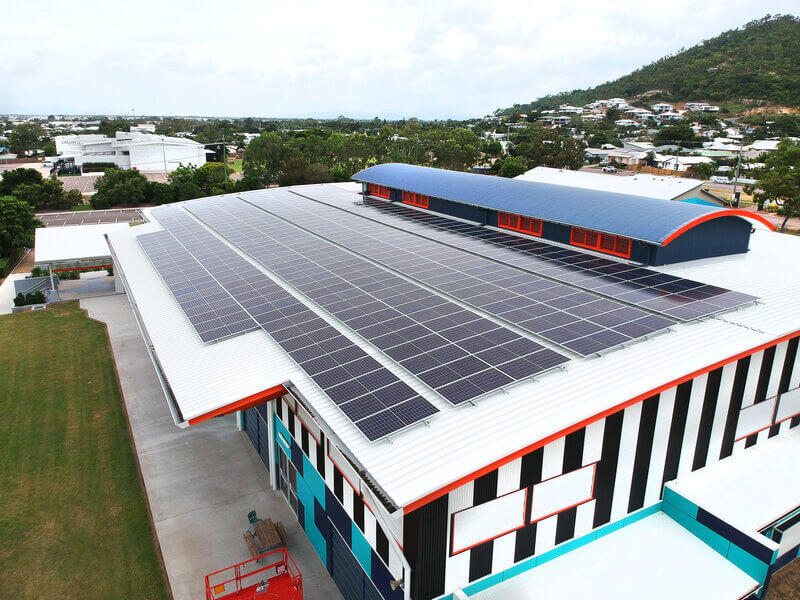Benefits of Commercial Solar Power
Commercial solar power, also known as solar energy, is a renewable source of energy obtained from the sun’s rays. Over the years, there has been a growing interest in utilizing commercial solar power as an alternative to traditional methods of electricity generation. As we continue to witness the adverse impacts of climate change, businesses are recognizing the benefits of switching to solar power.
In this article, we will explore some of the key advantages of commercial solar power and how it can benefit businesses of all scales and sectors. From cost savings to reducing carbon emissions, solar power has proven to be an invaluable investment for sustainable and eco-friendly practices.
Financial Benefits
Commercial solar panel installations offer several financial benefits for businesses, including various incentives, tax benefits, grants, and financial support options available at the federal, state, and local levels.
One significant financial benefit is the Small-scale Technology Certificate (STC) Rebate incentives. These incentives provide a subsidy for the installation of solar panels and are managed through the Renewable Energy Target scheme. They can significantly reduce the upfront costs of installing commercial solar panels.
Additionally, businesses can take advantage of tax benefits, such as the Investment Tax Credit (ITC) in the United States. This allows businesses to claim a federal tax credit of up to 26% of the total installation cost.
There are also numerous grants and financial support programs available to promote the adoption of renewable energy. For instance, the federal Department of Energy offers grants and loan programs specific to renewable energy projects. Furthermore, many states and local governments have their own grant programs or financial incentives to encourage businesses to invest in solar panel installations.
These incentives aim to reduce operational costs for businesses by lowering electricity bills through the generation of renewable energy. Commercial solar panel installations can significantly offset or even eliminate a business’s dependence on grid electricity, resulting in substantial long-term savings.
Overall, by providing incentives, tax benefits, grants, and financial support, government entities aim to promote the adoption of renewable energy sources like solar power. These financial benefits not only reduce operational costs for businesses but also contribute to a cleaner and more sustainable energy future.
Return on investment (ROI)
A commercial solar system offers numerous long-term financial benefits, making it a highly profitable investment for businesses seeking to reduce their operational costs. One of the key advantages is the potential for substantial cost savings on electricity bills. By harnessing the power of the sun, businesses can significantly reduce their reliance on traditional electricity sources and lower their monthly utility expenses. As electricity costs continue to rise, these savings can quickly add up, enhancing the return on investment (ROI) for the commercial solar system.
Furthermore, businesses can also take advantage of various financing options to maximize their financial benefits. Many financial institutions offer attractive financing options such as solar loans and power purchase agreements (PPAs) that allow businesses to install solar panels with minimal upfront costs. By spreading the cost over a fixed period, businesses can start reaping the financial benefits of the commercial solar system while paying back the loan or through long-term contracts with solar providers.
In addition to cost savings, businesses may also benefit from tax incentives and rebates associated with installing solar systems. Governments and utility companies often provide financial incentives to encourage companies to adopt renewable energy, offering substantial savings in terms of tax credits and rebates. Combining these financial advantages with the ongoing savings on electricity bills, businesses can achieve a high return on investment (ROI) by going solar.
Investing in a commercial solar system offers tangible financial benefits and an impressive return on investment. By significantly reducing electricity bills, taking advantage of financing options, and leveraging tax incentives, businesses can thrive financially while contributing to a more sustainable future.
STC Rebate
The STC (Small-scale Technology Certificate) rebate program is a government initiative designed to incentivize businesses to invest in solar PV systems. Under this program, businesses that install eligible solar PV systems receive a certain number of STCs, which can be traded and sold on the open market.
The benefits of the STC rebate program for businesses are significant. Firstly, it reduces the upfront cost of installing solar PV systems. The value of the STCs is deducted from the total cost of the system, making it more financially feasible for businesses to invest in renewable energy.
Additionally, the STC rebate program offers businesses the opportunity to generate additional revenue. By selling their excess STCs on the market, businesses can offset the cost of the system installation and potentially make a profit.
The eligibility criteria for the STC rebate program are relatively straightforward. To be eligible, businesses must install solar PV systems that meet certain technical requirements and are installed by a qualified installer. The systems must also be eligible for accreditation under the program guidelines.
The payback periods for solar PV systems with the assistance of STCs vary depending on a range of factors, such as the size of the system, the energy consumption of the business, and the local climate conditions. However, it is generally estimated that the payback period can be between 3 to 7 years.
The value of STCs for businesses is determined by market demand and supply. Currently, businesses can receive a significant financial incentive for each STC they generate. It is recommended for businesses to check the current incentives and value of STCs before making a decision.
It is important to note that there are various state and territory variations in the STC rebate program, as well as other incentives such as rebates and feed-in tariffs. These variations can impact the eligibility criteria, rebate amounts, and other aspects of the program. Businesses should research the specific regulations and incentives applicable to their location to maximize their benefits from the STC rebate program.
Reduced electricity bills
Reduced electricity bills have become a priority for many households and businesses around the world. With rising energy costs and increasing awareness of the environmental impact of excessive energy consumption, individuals are seeking ways to reduce their electricity bills while still maintaining a comfortable and efficient living or working environment. Implementing energy-saving practices and investing in energy-efficient appliances and technologies are some of the strategies that can contribute to lower electricity bills. Additionally, utilizing renewable energy sources, such as solar power, can also help reduce reliance on traditional electricity grids and further decrease monthly expenses. By adopting these methods, individuals and businesses can not only save money but also contribute to a more sustainable and greener future.
Environmental Benefits
Commercial solar panels have numerous environmental benefits that help in reducing carbon footprints, curbing greenhouse gas emissions, mitigating climate change, and preserving the environment. Firstly, these solar panels generate clean and renewable energy by converting sunlight into electricity. By using solar energy instead of conventional power sources like fossil fuels, commercial solar panels significantly reduce the reliance on carbon-intensive sources and consequently contribute to reducing carbon footprints.
Furthermore, commercial solar panels play a crucial role in curbing greenhouse gas emissions. Unlike fossil fuel power plants, solar panels do not emit any greenhouse gases during operation. By relying on solar energy, businesses can reduce their carbon dioxide, methane, and other greenhouse gas emissions. This reduction is vital in addressing the global climate crisis and mitigating climate change.
Moreover, the installation of commercial solar panels promotes the usage of clean and sustainable energy sources. As more businesses switch to solar energy, there is a gradual transition away from non-renewable sources. This transition helps in preserving the environment by conserving natural resources and reducing the environmental impacts associated with extracting and burning fossil fuels.
In conclusion, commercial solar panels provide significant environmental benefits. They reduce carbon footprints, curb greenhouse gas emissions, contribute to mitigating climate change, and aid in preserving the environment. By harnessing the power of the sun, businesses can play a crucial role in building a cleaner and more sustainable future.
Reduction in greenhouse gas emissions
Implementing solar energy systems for businesses can result in a significant reduction in greenhouse gas emissions. Solar energy systems harness the power of the sun to generate electricity without emitting any greenhouse gases. This clean and renewable energy source helps to mitigate climate change and reduce the reliance on fossil fuels.
The correlation between using fossil fuels in the electricity industry and carbon dioxide emissions is well established. Fossil fuels, such as coal, oil, and natural gas, release carbon dioxide when burned to produce electricity. Carbon dioxide is a major greenhouse gas that contributes to global warming and climate change. The more fossil fuels are used for electricity generation, the higher the levels of carbon dioxide emissions.
By using solar panels to generate electricity, businesses can take advantage of the numerous environmental benefits. Firstly, solar panels produce emission-free electricity. Unlike fossil fuel power plants, which release greenhouse gas emissions during operation, solar panels do not emit any harmful gases. This allows businesses to reduce their carbon footprint and minimize their contribution to climate change.
Secondly, using solar panels reduces the reliance on fossil fuels, decreasing the demand for them. This, in turn, promotes the conservation of fossil fuel resources and helps to protect ecosystems that are impacted by fossil fuel extraction and combustion.
Implementing solar energy systems for businesses can lead to a significant reduction in greenhouse gas emissions. By using solar panels, businesses can generate emission-free electricity and decrease their carbon footprint, contributing to a cleaner and more sustainable future.
Use of renewable energy sources
Renewable energy sources have become increasingly important in today’s world due to their positive impacts on sustainability and cost savings for businesses. One of the most commonly used renewable energy sources is solar energy, which has a multitude of uses.
Solar energy can contribute to sustainability by reducing greenhouse gas emissions and dependence on fossil fuels. By using solar power, businesses can significantly decrease their carbon footprint and contribute to a cleaner environment.
In terms of cost savings, solar energy can lead to substantial reductions in electricity bills. Businesses can generate their own electricity through solar panels, reducing their reliance on traditional energy sources and saving money in the long run. Additionally, some regions offer incentives and tax breaks for businesses that adopt solar energy, further increasing cost savings.
Installing solar panels also has significant benefits. It is a truly renewable energy source, as the sun is estimated to last another 5 billion years. This ensures long-term energy availability for businesses. Moreover, advancements in solar technology have led to increased efficiency, making solar panels more reliable and capable of producing higher outputs of electricity.
Renewable energy sources, particularly solar energy, offer numerous benefits for businesses. By using sustainable and cost-effective means of generating electricity, businesses can contribute to a cleaner environment, reduce costs, and future-proof their energy needs. Embracing renewable energy is a wise choice both financially and environmentally.
Initial Investment Considerations
When exploring the world of investments, it is important to carefully consider several factors before making an initial investment. These considerations play a crucial role in determining the success and profitability of an investment. From analyzing one’s financial goals and risk tolerance to understanding the market trends and researching potential investment options, taking the time to make informed decisions can greatly impact the outcomes of an investment venture. As such, this article will delve into some key initial investment considerations that individuals should be aware of before taking the plunge into the investment world. Whether you are a seasoned investor looking to expand your portfolio or a beginner venturing into this realm for the first time, these considerations will serve as a valuable guide to help you make informed investment decisions and achieve your financial goals.
Upfront Costs
Upfront costs refer to the expenses incurred at the beginning of a project or investment. When implementing a project, it is essential to have a detailed breakdown of the expenses involved to ensure proper planning and budgeting. The upfront costs can vary based on several factors such as location, size of the project, and specific requirements.
Typical components contributing to upfront costs include equipment, materials, labour, permits, and licensing fees. Equipment costs can vary depending on the complexity and scale of the project. Materials costs depend on the type and quantity of materials needed. Labour costs are influenced by local wages, labour availability, and the number of workers required. Permit and licensing fees vary depending on the location and regulatory requirements.
These upfront costs can be substantial and might pose a financial burden for individuals or organizations. However, various financing options are available to cover these costs. Loans from banks or financial institutions can provide the necessary funding, and their terms may vary based on factors such as creditworthiness and interest rates. Additionally, grants and rebates offered by governments or organizations can provide financial assistance to offset upfront costs.
In conclusion, upfront costs are an important consideration when implementing a project. The breakdown of expenses for equipment, materials, labour, permits, and licensing fees can vary based on location, project size, and specific requirements. To finance these costs, options such as loans, grants, and rebates can be explored. Proper planning and budgeting are crucial to ensure the successful implementation of any project.
Cost of solar panels and installation
The cost of solar panels and installation has significantly decreased over the past decade, according to the Solar Energy Industries Association (SEIA). Initially, the installation costs of solar panels were high, making it less accessible to homeowners and businesses. However, with advancements in technology and increased adoption of solar energy, the costs have decreased by over 70%.
The decrease in solar costs can be attributed to various factors. Firstly, improvements in manufacturing processes have made solar panels more efficient and less expensive to produce. Secondly, increased competition in the solar market has played a significant role in driving down prices. Moreover, government incentives and subsidies have further encouraged the adoption of solar energy, making it more affordable for consumers.
In terms of ongoing maintenance expenses, solar panels require minimal upkeep. They are designed to be durable and long-lasting, requiring only occasional cleaning to maintain their efficiency. Some manufacturers provide warranties that cover any maintenance or repair costs during the panel’s lifespan.
Financing options also make solar panel installation more accessible. Many companies offer financing solutions such as solar leases and power purchase agreements, allowing consumers to avoid the upfront cost of purchasing solar panels. These financing options typically involve fixed monthly payments, making it easier for homeowners and businesses to budget for solar energy.
One of the significant advantages of installing solar panels is the potential return on investment (ROI). As electricity prices continue to rise, solar power becomes a cost-effective alternative in the long run. The ROI for solar panels depends on various factors such as location, energy consumption, and available incentives. However, homeowners can typically expect to recover their investment within 5 to 10 years and enjoy years of virtually free electricity afterward.
In conclusion, the cost of solar panels and installation has decreased by over 70% in the past decade, making it more affordable and accessible. With minimal ongoing maintenance expenses, various financing options, and the potential for a solid return on investment, solar energy installation offers economic and environmental benefits for homeowners and businesses alike.
Financing options available for business owners
As a business owner, finding the right financing options is crucial for the growth and success of your company. Whether you are just starting out or looking to expand, having access to adequate capital can make all the difference. In this article, we will explore various financing options available for business owners, including traditional loans, lines of credit, crowdfunding, venture capital, and angel investors. Understanding the advantages and disadvantages of each option can help you make informed decisions and select the option that best suits your business needs. Let’s dive into the world of financing and discover the possibilities that can fuel your entrepreneurial dreams.
Long-Term Savings
In today’s ever-changing world, the concept of long-term savings has become increasingly important, especially for businesses. One way to significantly reduce expenses and achieve financial benefits over an extended period is through the installation of commercial solar panels.
By generating their own solar energy, businesses have the opportunity to reduce their electricity bills dramatically. This alternative energy source presents an attractive solution that minimizes reliance on traditional energy sources. Not only does this mean substantial savings in the long run, but it also demonstrates a commitment to sustainability and environmental responsibility.
One of the most critical aspects of considering commercial solar panels is understanding the potential return on investment (ROI). While the upfront costs of installation may seem significant, the long-term financial advantages should not be overlooked. Investing in solar energy can yield significant savings over time, allowing businesses to reallocate funds to other areas of operation. Additionally, exploring financing options such as leasing or power purchase agreements can further optimize the financial advantages of solar panels by spreading out the initial expenses.
In conclusion, opting for commercial solar panels can provide businesses with long-term savings and financial benefits. By reducing electricity bills and minimizing reliance on traditional energy sources, companies can allocate funds more efficiently while also showcasing their commitment to sustainability. Exploring financing options can optimize the financial advantages of solar panels, making it a wise investment for businesses of all sizes.
Comparison of electricity costs with and without solar power
The comparison of electricity costs with and without solar power is a significant consideration, especially given the recent increases in electricity prices in Australia. Solar power has the potential to dramatically reduce electricity costs, providing both businesses and homeowners with substantial savings.
Without solar power, electricity costs have been steadily rising in Australia. The country has experienced a substantial increase in electricity prices over the past few years, putting a strain on households and businesses. This upward trend in costs has made it increasingly challenging for individuals and organizations to manage their energy expenses effectively.
However, by harnessing solar power, individuals and businesses can achieve cost savings and future-proof themselves against rising electricity prices. Solar power systems produce electricity from sunlight, which is a renewable energy source. With solar panels, individuals and businesses can generate their own electricity, reducing their dependency on the grid and lowering their energy bills.
Solar power offers significant cost savings because it provides an independent energy source, which can reduce or even eliminate the need to purchase electricity from traditional sources. By generating electricity on-site, homeowners and businesses can offset their energy consumption, resulting in substantial savings over time.
In addition to the immediate cost savings, solar power allows businesses and homeowners to future-proof themselves against the ongoing increases in electricity prices. As electricity costs continue to rise, those who have invested in solar power systems can protect themselves from the impact of these increases. They are able to lock in their energy costs, ensuring stability and predictability for the long term.
By embracing solar power, individuals and businesses can not only reduce their electricity costs but also safeguard themselves against future price hikes. The cost savings and future-proofing provided by solar power make it an attractive and viable option for those looking to manage their energy expenses effectively.
Potential financial benefits over time
Solar energy offers numerous potential financial benefits for businesses over time. One of the primary advantages is the reduction in operational costs. By harnessing the power of the sun, businesses can significantly decrease their reliance on traditional energy sources, thereby reducing their utility bills. This is especially advantageous for businesses with high energy demands, such as manufacturing plants or large retail stores.
Moreover, solar power can attract eco-conscious customers. As sustainability becomes an increasingly important consideration for consumers, businesses that demonstrate their commitment to renewable energy sources like solar power can stand out in the market. By investing in solar energy, businesses can enhance their brand image and appeal to a growing segment of environmentally conscious customers.
In addition to these specific benefits, solar power plays a crucial role in creating employment opportunities and stimulating the wider economy. The installation, maintenance, and production of solar panels require a skilled workforce. Consequently, the adoption of solar energy increases job opportunities within the renewable energy sector, providing economic growth and stability.
Overall, businesses that embrace solar energy can not only experience financial savings through reduced operational costs but also position themselves as environmentally responsible, attracting eco-conscious customers. Moreover, the widespread adoption of solar power can contribute to job creation and have a positive impact on the overall economy.














